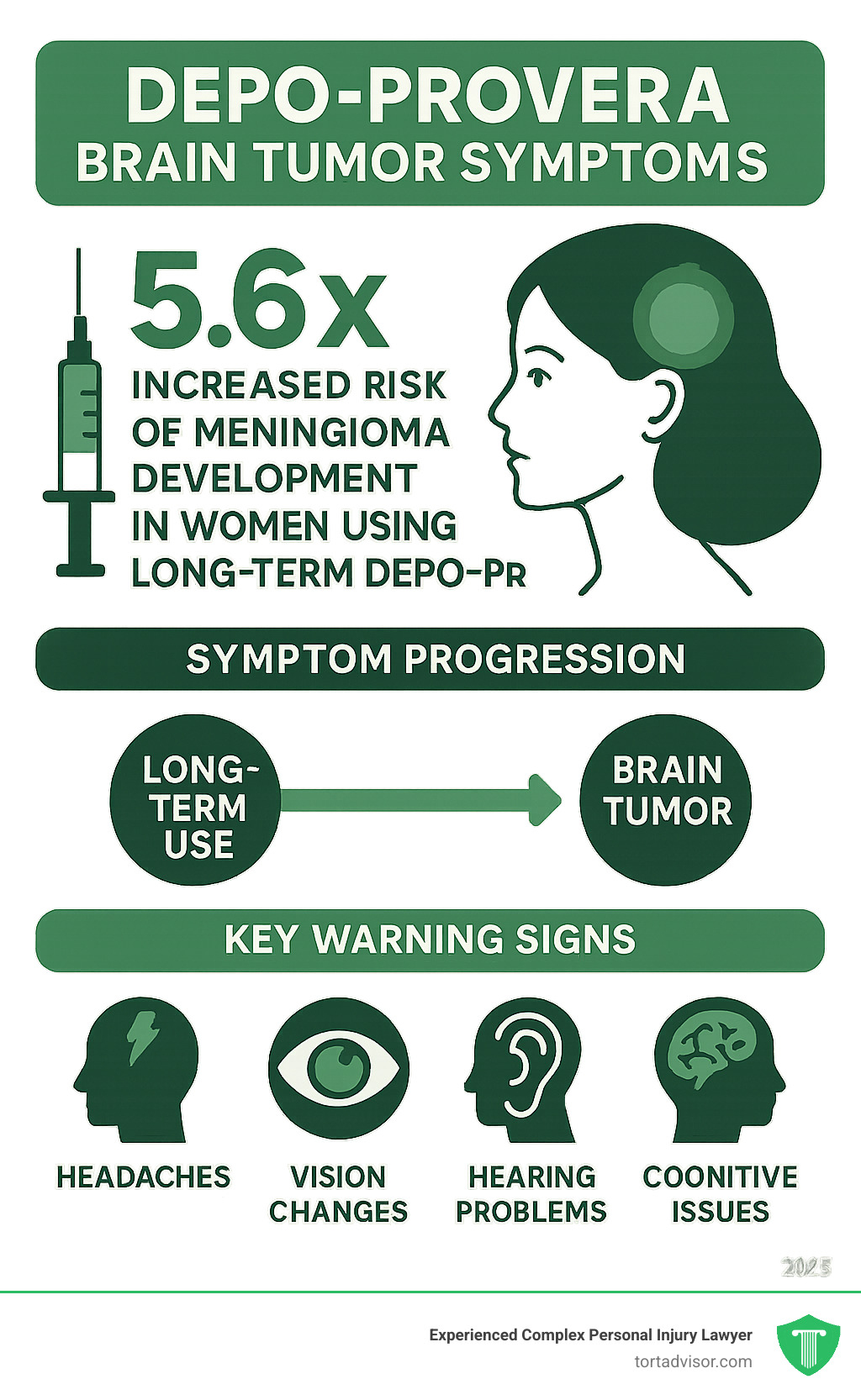


Why Recognizing Brain Tumor Warning Signs Could Save Your Life
Depo provera brain tumor symptoms can be subtle but life-threatening if ignored. Recent medical research shows that women using this birth control injection for over a year face a 5.6 times higher risk of developing brain tumors called meningiomas.
Key Depo-Provera Brain Tumor Symptoms to Watch For:
- Persistent headaches that worsen when lying down
- Vision problems including blurred or double vision
- Hearing loss or ringing in the ears (tinnitus)
- Memory issues and difficulty concentrating
- Seizures or unexplained tremors
- Weakness or numbness in arms, legs, or face
- Balance problems or dizziness
These symptoms may not appear until you’ve used Depo-Provera for a year or more, as meningiomas grow slowly. Concerningly, Pfizer updated warning labels about brain tumor risks in Europe and Canada but not in the United States.
For example, one woman used Depo-Provera for nearly 20 years before developing symptoms like memory loss and headaches. An MRI revealed a brain tumor that required major surgery.
My work connecting injury victims with qualified attorneys has shown me that early recognition of these symptoms is critical. It can be the difference between a manageable condition and a life-altering crisis.
Must-know depo provera brain tumor symptoms terms:
What is Depo-Provera and Its Link to Brain Tumors?
If you’ve used Depo-Provera, you deserve to know about its potential risks. While millions rely on this injection for contraception, recent research has uncovered a troubling link between its long-term use and brain tumors.
Let me walk you through what we now know about this connection.
How the Depo Shot Works
The Depo-Provera shot is a hormonal birth control injection given every three months. It contains only one hormone, medroxyprogesterone acetate, a synthetic progestin. This hormone works by preventing ovulation and thickening cervical mucus. Its convenience has made it a choice for millions of women worldwide. However, the same hormone that makes it effective may also trigger the growth of brain tumors in some women. You can learn more about the broader health impacts in this resource about Depo-Provera Severe Side Effects.
What is a Meningioma?
Meningiomas are tumors that grow in the meninges, the protective layers surrounding the brain and spinal cord. Most meningiomas are benign (not cancerous) and grow very slowly. However, “benign” doesn’t mean “harmless.” Because the skull is a closed space, even a slow-growing tumor can cause serious problems by pressing on brain tissue, nerves, and blood vessels. This pressure is what causes depo provera brain tumor symptoms. These tumors can grow for years before symptoms appear, by which time they may be quite large. The Mayo Clinic overview of meningiomas provides excellent detail about how these tumors develop.
The Scientific Evidence Linking Depo-Provera to Meningiomas
The connection between Depo-Provera and brain tumors is backed by solid medical research. A groundbreaking study in the British Medical Journal in March 2024 revealed that women who use Depo-Provera for more than one year face a 5.6 times higher risk of developing meningiomas compared to non-users. The risk increases with longer use.
Researchers believe this happens because meningiomas are sensitive to progesterone, and Depo-Provera floods the system with a synthetic version of this hormone. It’s like giving fertilizer to a plant you don’t want to grow.
What’s especially troubling is that Pfizer, the maker of Depo-Provera, has updated warning labels in Europe and Canada to include brain tumor risks, but has not done so for American women. You can read the full details in this landmark study in the British Medical Journal.
This research has prompted serious questions about pharmaceutical transparency. If you’re wondering about the broader implications, this article explores Does Depo-Provera Cause Brain Tumors? in greater depth.
The bottom line is that the scientific evidence is concerning. If you’re experiencing neurological symptoms and have a history of Depo-Provera use, it’s time to seek medical attention.
A Comprehensive Guide to Depo-Provera Brain Tumor Symptoms
Understanding depo provera brain tumor symptoms is critical. These symptoms often mimic everyday health issues and can be easy to dismiss. Because meningiomas grow slowly, warning signs appear gradually over years. As a tumor grows within the confined space of the skull, it creates pressure that disrupts normal brain function.
Early and Common Warning Signs
Early signs often include persistent headaches that are more intense than usual and worsen when you lie down. These may present as new or different migraines. Vision problems are another major red flag, including blurred or double vision or partial vision loss. Ear-related symptoms include gradual hearing loss, tinnitus (ringing in the ears), and dizziness or balance problems. Persistent nausea and vomiting, especially with headaches, can also indicate increased pressure in your skull.
Neurological and Cognitive Depo-Provera Brain Tumor Symptoms
As a meningioma grows, it can cause more frightening symptoms. Seizures are a serious warning sign, especially if you’ve never had them. You might also experience unexplained tremors. Weakness, numbness, or tingling often appears on just one side of the body as the tumor presses on specific nerve pathways. The cognitive symptoms can be particularly distressing, starting with minor memory loss and progressing to serious confusion and difficulty concentrating. You may feel like you’re in a mental fog. Personality changes, mood swings, and depression can also develop, often feeling more severe than typical hormonal effects. For more detailed information about these brain-related symptoms, our article on Depo Shot Brain Tumor provides additional insights.
How Soon Can Symptoms Appear After Starting Depo-Provera?
A key challenge is that depo provera brain tumor symptoms don’t appear right away. Because meningiomas grow very slowly, symptoms typically take at least one year or more to develop. The synthetic hormone in Depo-Provera acts as a gradual catalyst for tumor growth. Research shows the risk becomes significant after one year and increases with longer use. This means you might notice subtle changes like more frequent headaches or vision issues long after starting the injections. The gradual onset makes it crucial to track any changes in your health. A symptom log can be invaluable for your doctor. For more information about the timeline and development of these symptoms, check out our detailed guide on More info on the Depo Shot Brain Tumor.
What to Do If You Suspect a Depo-Provera Related Brain Tumor
If you’re experiencing depo provera brain tumor symptoms, it’s natural to feel concerned. Taking prompt action can make a significant difference in your diagnosis and treatment.
Steps to Take Immediately
Your health is the priority. Here’s what to do if you suspect a Depo-Provera-related brain tumor:
- Contact a Healthcare Provider: Schedule an appointment with your doctor. Describe your symptoms and your history of Depo-Provera use.
- Do Not Stop Medication Without Medical Advice: Abruptly stopping Depo-Provera can cause other issues. Follow your doctor’s guidance.
- Create a Detailed Log of Symptoms: Journal your symptoms, noting when they started, their frequency, and severity. This is invaluable for your doctor.
- Note Your Depo-Provera Usage History: Be ready to provide the dates and frequency of your injections.
How Doctors Diagnose and Treat Meningiomas
Diagnosing meningiomas begins with a medical history and a neurological exam to assess vision, hearing, balance, and cognitive function. The key diagnostic tools are imaging tests:
- Magnetic Resonance Imaging (MRI): An MRI provides detailed brain images to reveal a tumor’s size and location. Learn more at Magnetic resonance imaging (MRI).
- Computed Tomography (CT) Scans: A CT scan may also be used.
- Biopsy: A small tissue sample may be taken to determine the tumor’s grade.
Treatment depends on the tumor’s size, location, and growth rate:
- Observation (“Watch and Wait”): Small, asymptomatic tumors may be monitored with regular MRIs.
- Surgical Removal: This is the primary treatment for symptomatic or growing tumors.
- Radiation Therapy: Used after surgery to eliminate remaining cells or if surgery isn’t feasible.
Potential Long-Term Consequences and Prognosis
While most meningiomas are benign, their location can cause serious complications. Long-term effects depend on the tumor’s size, location, and treatment. Some patients may experience lasting neurological issues like memory problems, motor skill difficulties, or persistent headaches, impacting quality of life. The prognosis is generally favorable, especially for benign tumors that are completely removed, and many patients live for decades after treatment. However, regular follow-up is essential to watch for recurrence. Recovery can be challenging, and support systems are crucial.
Pfizer’s Failure to Warn and Your Legal Options
If you’re dealing with depo provera brain tumor symptoms after using this birth control, you deserve to understand your legal rights.
The Allegations Against Pfizer
A key issue is that Depo-Provera boxes in Canada and the UK have warnings about brain tumors, but U.S. labels do not. Canadian labels have mentioned meningiomas for nearly a decade. Lawyers argue that Pfizer was aware of the brain tumor risks but chose not to inform U.S. consumers, as investigated by Bloomberg Law: Pfizer accused of hiding tumor link. This means women made decisions with incomplete information, which is the basis for a “failure to warn” legal case.
Understanding a Depo-Provera Lawsuit
If you developed a brain tumor after using Depo-Provera, you may have a legal case under product liability law. The argument is that Pfizer failed to adequately warn American consumers of known risks. You might have a case if you used Depo-Provera for a year or more and were later diagnosed with an intracranial meningioma. Our Depo-Provera Lawsuit Criteria Guide has more details. Time limits (statutes of limitations) are crucial and can be as short as one year from finding the link, so don’t wait. These cases are handled as multidistrict litigation (MDL), which keeps your case individual while coordinating with similar ones for efficiency. Learn more at What’s the Legal Status of the Depo-Provera Lawsuits?.
What Compensation Can Be Sought in a Lawsuit?
A successful lawsuit aims to cover the full impact of the diagnosis. Medical expenses are a major part, including past and future costs for scans, surgery, and therapy. Lost income and reduced future earning capacity are also covered. Compensation for pain and suffering, emotional distress, and loss of enjoyment of life addresses the non-economic toll. In cases of gross negligence, punitive damages may be awarded to punish the company. For families who lost a loved one, wrongful death claims can provide financial support. Compensation varies by case; our Depo-Provera Settlement Amounts Lawsuit Guide has more info. Most personal injury attorneys work on contingency fees, so you pay nothing unless they win your case.
Frequently Asked Questions about Depo-Provera Brain Tumor Symptoms
I know dealing with concerns about depo provera brain tumor symptoms can feel overwhelming. Here are answers to the most common questions.
Can Depo-Provera cause cancerous brain tumors?
The vast majority of meningiomas linked to Depo-Provera are benign (Grade 1), meaning they are not cancerous and grow slowly. However, a small percentage can be more aggressive: atypical (Grade 2) or rarely malignant (Grade 3). While the key BMJ study didn’t specifically identify cancerous tumors in users, even benign brain tumors can cause serious health problems due to pressure inside the skull.
Is it safe to continue using Depo-Provera?
This is a decision to make with your doctor. Discuss your health history, how long you’ve used Depo shots, and any symptoms you’re experiencing. Your doctor can help you weigh the benefits against the risks for your specific situation. Many alternative contraceptives are available, and your provider can help you find one that works for you. The goal is to make an informed decision with all the facts.
How much does it cost to file a Depo-Provera lawsuit?
You shouldn’t have to pay anything out-of-pocket to file a lawsuit. Most personal injury attorneys, including those in the Tort Advisor network, work on a contingency fee basis. This means you pay no upfront costs, and the attorney’s fee is a percentage of the settlement or award they win for you. If your case is not successful, you owe nothing. This allows you to seek justice without financial risk.
Taking Control: Your Next Steps After a Meningioma Diagnosis
Facing a meningioma diagnosis, especially one linked to a trusted medication, is overwhelming. But you are not powerless. Knowledge is your greatest ally. Understanding the 5.6 times higher meningioma risk for long-term Depo-Provera users is crucial information that guides your next decisions.
Recognizing depo provera brain tumor symptoms early makes all the difference. Persistent headaches, vision changes, or memory problems are not symptoms to ignore. You now know what to watch for.
Contact your healthcare team immediately if you have concerning symptoms. Early intervention can dramatically improve your outlook, as most meningiomas are treatable.
You also have legal rights. Pfizer warned consumers in other countries about brain tumor risks but not in the United States. Companies have a responsibility to warn consumers, and they can be held accountable for failing to do so.
At Tort Advisor, we connect people like you with attorneys who understand complex pharmaceutical injury cases. Taking legal action can help you recover compensation for medical bills, lost wages, and suffering. It also sends a message that patient safety must come first.
Your next step is simple. Don’t let this go unaddressed. Find an experienced Depo-Provera Injury Lawyer through our network to evaluate your situation and explain your options. You’ve already taken the first step by educating yourself. Now let us help you take the next one.
Free Confidential Case Evaluation
Complete the short form below to get an immediate FREE case review with an expert in your specific claim. Don't wait, your case could be time sensitive to file a claim.
Related Posts
Discover New Jersey disability benefits: TDI, FLI, SSDI, SSI rates, eligibility, applications & appeals for 2025-2026.
Hire a Depo-Provera lawsuit attorney now. Fight Pfizer for meningioma risks from injections. Free consult, MDL updates & settlements up to $1.5M.
Find top Miami florida car accident lawyers after your 305 crash. Get max compensation, navigate no-fault laws & choose the best experts now!
Diagnosed with cancer after Roundup? Learn about the monsanto roundup lawsuits, eligibility criteria, and how to pursue your claim.
Discover how do you qualify for a hair relaxer lawsuit: criteria, diagnoses, evidence & brands in uterine cancer MDL. Claim review now!
Find the best uber sexual assault lawsuit lawyer: expert guides, MDL experience, proven results & nationwide firms for justice.









